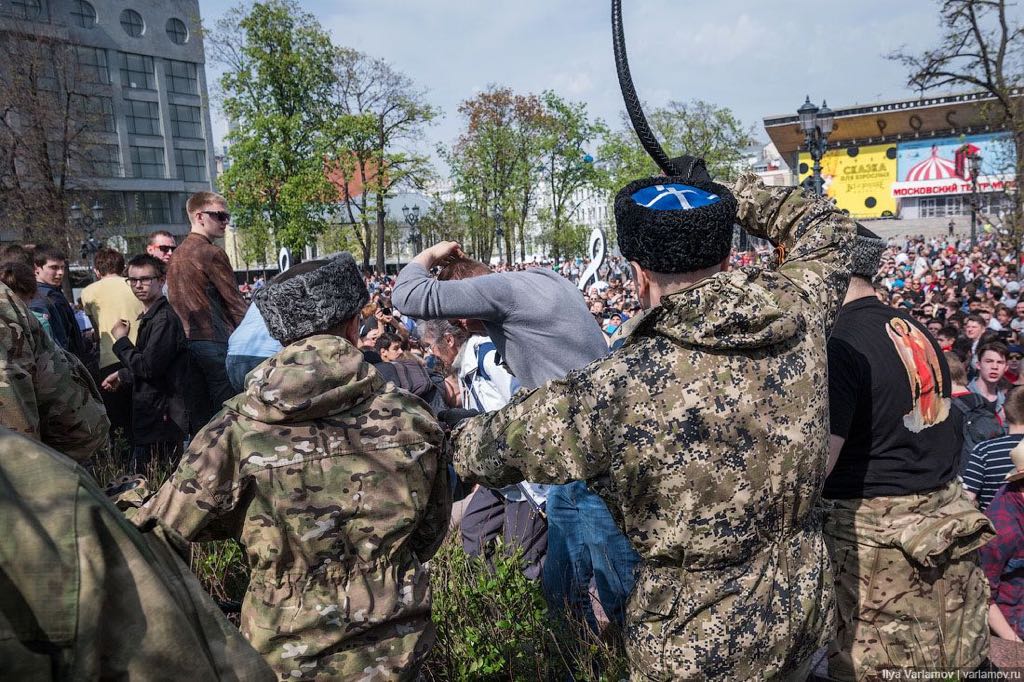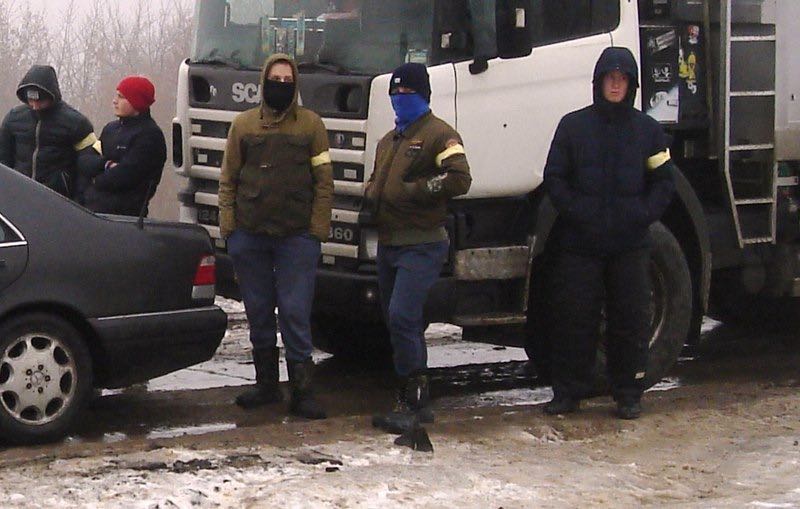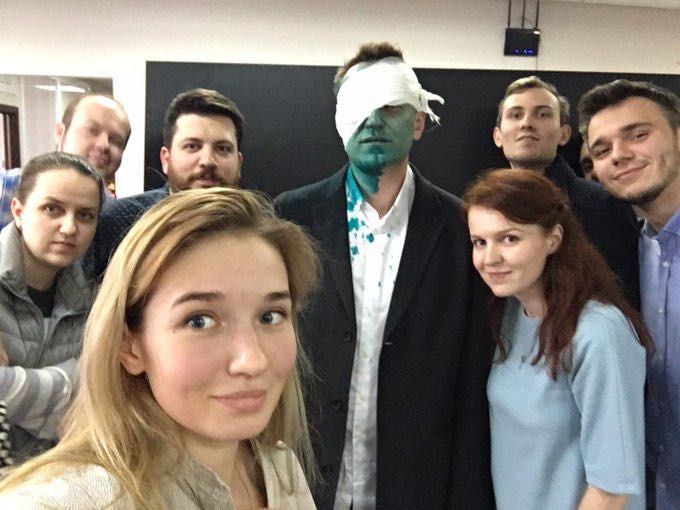There are signs that the monopoly on state violence in Russia is being shared with thugs from the streets. Is it possible to hire tough guys to rough up demonstrators? According to security specialist Mark Galeotti it is more about the 'theatre of violence', creating an environment to make people think twice to take part in protests. 'Think of it as homeopathic authoritarianism', very small doses of violence to disencourage the broad masses. Russia likes to 'cultivate the appearance of a rogue state, unpredictable, decisive and ruthless.'
 Cossacks in Moscow stick to their own laws. Sometimes they break up demonstrations, some are trained by the authorities (picture blogger Varlamov)
Cossacks in Moscow stick to their own laws. Sometimes they break up demonstrations, some are trained by the authorities (picture blogger Varlamov)
It has long been a feature of the overlapping realms of Russian crime and business that one can ‘order someone’ – in other words, pay to have them killed, hurt or threatened. The prices can range from the equivalent of a few hundred euros to tens of thousands, depending on the expertise of the contractor, the profile and security of the target, and the vagaries of the market. But how much to break up a meeting? How much to topple a government? In the light of recent revelations about the semi-open ‘rent-a-thug’ market, as well as the expansion of the activities of Russian private military companies, is violence truly just another commodity – or is it simply another aspect of the dramaturgiya of modern Russian politics?
A market for muscle
Last month, Meduza ran a fascinating and disturbing investigation by Liliya Yapparova who, for just 200,000 rubles (€2,800), ordered up a hundred 'tough guys' who were 'ready to use force' for a protest. Nor was this a one-off case, with all kinds of communities – from sports clubs and Cossacks to ultra-nationalists and football fanaty – being involved in the provision of such thuggish services.
This certainly does demonstrate not simply that there is a market for muscle, but that it is a relatively mature one. Vadim Volkov, now rector of the European University at St. Petersburg, developed in his book of the same name, the concept of the ‘violent entrepreneurs,’ who turn their capacity to use force into a monetisable asset. What Yapparova’s article makes clear is that this also generates the ‘violent broker’ who, while keeping his own hands clean, connects buyer and seller and implicitly regulates the market.
What is also clear is that there is a political, or at least state dimension. The police and the security apparatus are well aware of this criminal business and while they may make specific arrests at specific times, there appears no interest in closing the market as a whole. In part this may be explained through simple corruption, but it also clearly reflects the essentially conservative nature of the mercenary mayhem.
 'Titushki' are hired thugs who are used to rough people up (picture Alex Long Creative Commons, 2018)
'Titushki' are hired thugs who are used to rough people up (picture Alex Long Creative Commons, 2018)
It is not simply that the providers tend to be on the nationalist end of the spectrum, including the infamous ultra-right SERB movement, but also that their so-called 'street technology' is typically deployed either against liberals, from civil society groups to LGBT+ activists, or else as part of commercial disputes, which are themselves part of the normal process of business po-Russkii, Russian-style. In other words, their violence is specifically directed towards maintaining the status quo, not challenging it, even if ostensibly this would best be served through order on the streets.
Violent Theatricals
However, one should not make the mistake of assuming thus that the real and threatened violence is ultimately committed by or for the Kremlin. This is, after all, an adhocracy in which power is often exercised by multiple, semi-autonomous actors, frequently working not to instructions but from their expectations about what the boss(es) would like to see done. It is also an often chaotic and under-controlled state. All one can assert with confidence is that the Kremlin is willing to see this market exist, and no doubt it uses it from time to time.
But only from time to time. There is a difference between this and the kinds of large-scale extra-legal violence that was such a feature of the 1990s, or which is associated with the infamous titushki of Yanukovych’s Ukraine or, indeed, Venezuela’s paramilitary colectivos. Opposition groups do get to protest; civil society can organise; workers still get to strike, all without the likelihood of violence. Instead, the fact that sometimes the 'street technologists' will get involved, and that it is often impossible to guess whether that will happen, or how far they will go (just some jeering and jostling? throwing punches or the distinctive brilliant green zelenka antiseptic that has died so many activists? worse?) is actually the point.
 Oppositionist Navalny smeared with green antiseptic 'zelenka'. His eye was damaged (foto twitter)
Oppositionist Navalny smeared with green antiseptic 'zelenka'. His eye was damaged (foto twitter)
Just like the almost random prosecution of individuals for making or sharing supposedly subversive internet messages, or the unpredictable treatment of street protests, the intent is not to create a full-blown totalitarianism. Rather, it is about the theatre of violence, creating an environment in which the spectre of repression generates self-censorship and caution out of proportion to the relatively limited amount of genuine violence applied. Think of it as homeopathic authoritarianism, very small doses intended to make the subject respond as if it had taken a full course of treatment.
It makes sense, after all. Russia has a hybrid of real democracy and purely fictional politics. The borders between real and fake news can be almost imperceptible. It has a working judiciary as well as the crassest examples of 'telephone justice' and judgements-for-sale. It has a free market economy – except when it doesn’t. Why shouldn’t it also have both real and fake authoritarianism?
Thug IR
Just as in the 1980s, veterans of the ugly Soviet war in Afghanistan became a new source of 'violent entrepreneurs' for the emerging organised crime groups, and in the process changed them, so too it is clear that fighters from the undeclared war in the Donbas are joining the 'street technology' market now. This is hardly surprising, given that they have largely been abandoned and neglected after they are no longer of use – creating an interesting new political force, the anti-Putin nationalists, such as the original Donbas ultra, Igor ‘Strelkov’ Girkin – but they also experienced the increasingly violent cutting edge of Russian foreign policy.
In Syria, we have seen mercenaries from the Russian Wagner Group involved in the beheading, dismembering and setting fire to a Syrian 'deserter' in 2017, while on a wider scale, Russian airpower and artillery has pounded cities such as Aleppo with scant regard for human life and international norms.
In Europe, we have seen attempted assassinations and what appear to be successful ones, as well as especially flagrant acts of electronic sabotage and espionage.
Is this evidence that Putin’s Russia is out of control, a vicious enemy of the international order, as its critics claim? Not quite. After all, it is hardly unique in deploying violence in support of its goals – ask the Yemenis about the Saudis, or the Afghans about the Americans, or the Kurds about the Turks, or… - and in practice, the Kremlin tends carefully to manage the risks in its adventures.
At the same time, it also seems to be seeking to cultivate the appearance of a rogue state, unpredictable, decisive and ruthless. This demonstrates the often performative dimension of what the scholar Ben Tallis has dubbed 'Thug IR', the international relations of the gangster state. What matters in politics, after all, is not so much what you are but what others perceive you to be. Just as a judicious amount of 'street technology' may help make potential critics and agitators hold their tongues, so too the appearance of being the geopolitical gangster may appear very convenient for a second-rank nation trying to persuade the world to treat it as a great power: the theatre of violence applies as much to the globe as to the city square.
